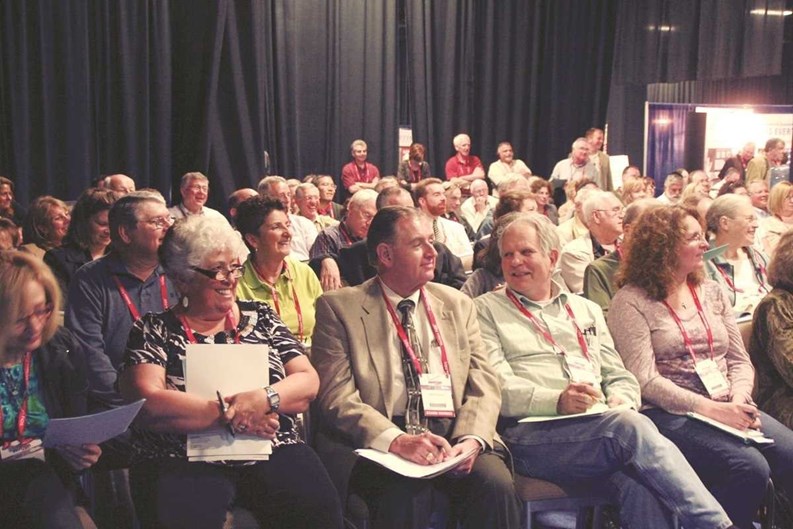Launched just three years ago, New England Condominium’s annual Condo Expo has already become a fixture on the business calendar of vendors, service providers, board members, building staff members and residents throughout the region. Each year, they converge under one roof to learn about new products and technologies, exchange information, network and improve how their buildings and associations are run.
The 2011 Expo was no exception—nearly a thousand community association owners, board members and professionals filled the Seaport World Trade Center on Tuesday, May 24, 2011, to visit some 120 exhibit booths and take in this year's lineup of informative educational seminars.
According to Yale Robbins, president of Yale Robbins, Inc., producer of the Expo and publisher of New England Condominium, producing the Expo is more than just organizing a trade show. “Obviously our goal is to present attendees with information and products that will make running their associations easier and more efficient, but we also put a great deal of thought into the bigger picture, anticipating trends and trying to broaden and build on our offerings from one year to the next.”
Henry Robbins, executive vice president and director of sales for Yale Robbins, Inc., agrees, adding that despite the sluggishness of the economy overall, attendance and interest in the Expo—both from vendors and attendees—has shown steady growth over the past three years. “It's really our exhibitors and our attendees who make this show what it is,” says Robbins. “Their enthusiasm and interest is contagious—the fact that the event grows and draws more people each year is proof of that.”
Education, Advice & More
Along with the exhibitor booths, one of New England Condominium’s annual Condo Expo mainstays is the day’s lineup of educational seminars. For this year’s Expo, four different topics were presented by an array of experts from every corner of the industry.
The day's programming kicked off with a look at “Your Online Presence,” offering tips and cautions about the impact of today’s social media on community associations. The panel of speakers—which included David J. Levy of Sterling Services; Attorney Stephen Marcus from Marcus, Errico, Emmer & Brooks, PC; Deborah Jones from American Properties Team; and Michael Kohan from AtHomeNet —addressed the importance of using today’s social media wisely.
Online communications have become so integral to today’s lifestyles, Jones said, that APT has made web-based components “a part of the management services we provide.”
Discussing topics ranging from “static” community websites to the administration of online discussions that can turn into complaint sessions, or worse, panelists admitted there are many issues to be considered with social media. While there is often a tendency to try to control comments, Marcus indicated that in most situations, he leans more toward letting people speak than toward censorship, although, because condominium associations are not government entities, “freedom of speech” is not a relevant issue. But associations don’t have to offer open discussion channels.
Levy noted that the cost of offering web-based services for associations is minimal—and well worth the cost in terms of opening lines of communication. At the same time, in response to a question, he noted that it’s important that associations not ignore residents who do not use computers. There are easy ways, he said, to ensure that non-computer users receive all pertinent information that is circulated online.
Questions about the accessibility of financial information online were among the hot topics before the panel, along with a litany of ways in which associations can take advantage of these new technologies.
Attracting a standing-room-only crowd was the legal seminar sponsored by Goodman, Shapiro & Lombardi, LLC of Dedham, MA and Providence, RI.
“Collecting Common Fees and Enforcing Rules” touched on two of the big “hot button” topics for community associations today—and brought a deluge of questions from board members dealing with the issues.
“Common fees are the fuel that drives the condominium’s operation,” Attorney Ellen Shapiro told the seminar attendees. Without them, she said, “condominiums could not operate. Without them, you can’t pay your insurance, your vendors, property manager, your snow plow people.” With that in mind, collecting those fees is essential. With non-payment of fees becoming a growing concern, Shapiro noted, priority lien laws like the Massachusetts “super lien” statute have become increasingly important.
But, Shapiro cautioned, the super lien “is a time-sensitive matter … failure to take action in a timely manner can mean you lose your ability to collect” under that limited priority law. Walking the audience through the collection and foreclosure process, Shapiro noted that the priority lien law “is a very, very powerful tool. I can not stress strongly enough how powerful it is. It is the single most powerful tool that boards have.”
Attorney Henry Goodman cautioned board members to be certain to give owners appropriate notice in an enforcement action. “We recommend you hold a due process hearing, to determine whether or not your documents should be enforced” in a given situation. And while association boards often end their enforcement action with the imposition of fines—even daily fines that can add up to a significant amount—Goodman reminded trustees in attendance that fines are simply a tool. “If they work, that’s great,” Goodman said. “But if the fines don’t work, you enforce the documents” by other means, including use of the super lien statute.
And finally, GSL Attorney Frank Lombardi cautioned board members not to be swayed by the common refrains of “I didn’t know” about the rule; “Everyone else is doing it;” and the ever-popular, “What’s the big deal about letting it go?” The association’s bylaws, rules and regulations apply to everyone and should be enforced, he said.
The fact that associations are wrestling with a host of issues related to keeping their buildings physically fit was driven home during a seminar on “Your Aging Condo.” Moderated by engineer Ralph Noblin, the panel—featuring Mike McDuffee from Corolla Roofing; Russ Fernandes from Becht Engineering; Andrew Musto from U.S. Pavement Services; and Michael A. Pasquino from Barkan Management—looked at the challenges of repair and replacement of association building components.
“Everyone lives in an aging condominium,” Fernandes reminded the audience. “Even if it’s only a year old, it’s aging. No matter how old your community is, you have roofs, you have pavement that are going to have to be replaced.” Noblin and Fernandes explained the use of the reserve study in helping associations to create specifications for projects, and to plan for the future. “Projects can be difficult to move forward,” Noblin said, “but they need to be well thought out.”
Audience members came armed with questions about their own associations’ ongoing struggles with repair and replacement projects, and the panel guided them through the steps involved in various projects as well as reasonable expectations regarding life cycles and warranties.
A seminar on bringing association rules and regulations into tune with contemporary living, “Pets, Pools, Parking and Smoking” took the traditional trio of controversial issues a step further, addressing topics like today’s prevalent tug-of-war over second-hand smoke. Attorney Frank Flynn of Boston-based Downing & Flynn and Tim Arel from NH and MA-based North Point Management deftly fielded questions and offered ideas and solutions for updating condo rules.
“If you’re going to regulate the use of the units,” Flynn said, “it has to be in the condominium bylaws.” The Massachusetts Supreme Judicial Court, in a 1975 decision called Johnson v. Keith, indicated that if there is any ambiguity in an association’s rules or bylaws, “it’s going to be construed in favor of freedom of use,” he added.
It’s important, therefore, that associations ensure that their rules and bylaws are written clearly.
Change, however, doesn’t always come easy. Arel advised boards to get the information about proposed changes out, allow owners to give input, review the comments and consider incorporating those comments into a revised proposal before bringing a new bylaw to a vote. “Your objective is to get and build a consensus, so that when you take that formal vote you can reach that 67 or 75 percent majority required to adopt the amendment,” he said.
“It’s easy to pass a rule or regulation,” Flynn added. “In most cases, it just requires a majority vote of the trustees.” Changing bylaws is a different story. “If you’re going to pass a rule to restrict smoking in the common areas, that’s pretty easy; but if you’re going to tell people they can’t smoke in their units, that’s harder.”
Gifts & Giveaways
Exhibitors come to the Expo to get their products and services in front of thousands of building decision-makers; attendees come for information, networking, education and, of course, prizes. Exhibitor-sponsored prizes at the 2011 show included gift cards, iPods, power tools, Red Sox tickets, and the grand prize, a $2,500 contribution to one lucky building's reserve fund, courtesy of Yale Robbins, Inc. and New England Condominium. Essex Management Group added to the excitement with its prize of a $2,000 credit for management and consulting services, and JnR Gutters awarded a lucky association a $2,000 credit toward exterior services such as gutters, decks, siding, roofing and windows.
Many annual favorites returned as well. The always-popular cyber café did brisk business all day, and guests could also take advantage of an array of distinguished professionals from across the residential industry who generously donated their time in the free advice booth area.
Next Year’s Expo…
Even before the 2011 Expo wrapped up and exhibitors started taking down their booths, planning and preparation began for the 2012 show. Next year's show promises to be even bigger and better, with more exhibitors, more seminars, and more of what makes New England Condominium’s annual Condo Expo so great. The 2012 Expo will return to the Seaport World Trade Center on May 22 next year with an even more diverse array of exhibitors, another roster of enlightening educational seminars, and more business networking opportunities per square-foot than any other such trade show in the region. Stay tuned to www.ne-expo.com for dates, more information, important deadlines, and online registration. We look forward to seeing you there!







Leave a Comment